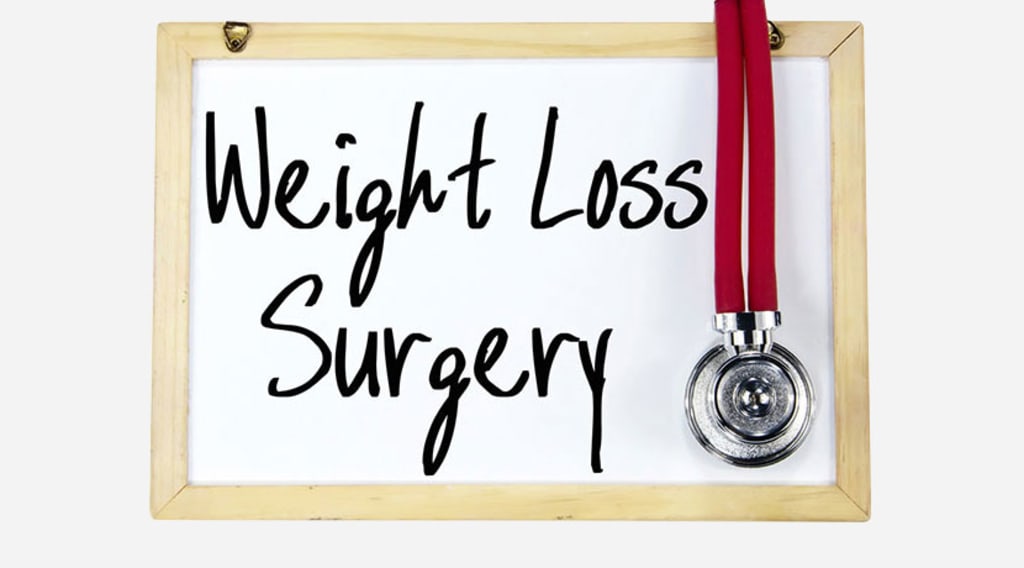An Educational Look Through the Stigma
Bariatric Surgery

When I tell people I’m about to have weight loss surgery, I can see the multitudes of thoughts that go through their head enter their brain with an almost concussive force.
Here are some of the thoughts that no one ever says out loud:
“Why can’t you just exercise to lose weight?”“Cheater.” “Looking for a quick fix.”“They must be lazy.”
Maybe the people you tell this life changing news aren’t actually thinking those things — but more than likely the thought has crossed the minds of a few of your friends/family. It’s inevitable. People are always going to come to snap judgments — even people who do not know you. And that is something that could make you almost ashamed of admitting you’re about to have surgery. For us bigger people, we deal with a lot of shame. Shame of ourselves, shame when we eat, self-shaming, public shaming. It starts off small. Snide comments we notice, then it grows from there. Eventually we start shaming ourselves. It’s natural.
Then you have the ones who love you, and you see their face furrow in concern, their lips pucker, and their minds reeling. And then they launch into a “there must be a different alternative…” mindset. Usually the concept of the following jump conclusions is the same:
“What about the vegetarian diet?”
Or: “Oh you know, I tried this diet and did this kind of exercise, I lost so much weight and felt so much better!” Or they very concernedly point out that maybe if you just ‘eat better’ and ‘exercise more’ that you can lose weight.
And you know what? Maybe they are right. About some people. But that does not mean it pertains to you. I’m hoping that many ‘concerned’ friends and family members of someone who is going through weight-loss surgery read this. Because I have a very important message to you all. And that includes my personal friends and family who just think an ‘alternative route’ might be ‘better.’
Please, take note — A LOT of the time, concerned friends and family who, upon learning about your upcoming surgery, go into automatic ‘advice’ mode aren’t actually trying to come off as if they aren't supportive. Bariatric surgery has risks. There are horror stories of surgeries going horribly wrong. There are people who are prime examples of unsuccessful surgeries, or surgeries with complications that lead to pain and suffering. I am acknowledging that there are some scary things out there, and it's natural instinct for someone to immediately worry about someone they love.
But there are those of our family and friends that just don’t get it. They don’t want their loved one to get the surgery. They love them just the way they are. They are just fine, and they don’t need a surgery to define who they are. And that’s wonderful, and beautiful. These are wonderful people to have in your life (that is, if they are genuine). Because they ARE right. But sometimes, it goes deeper than that. Getting this surgery is not just about looks. It's mostly about overall health. So, please continue to read. Because I just want to share as someone who is going to get bariatric surgery a point of view that can cut through the stigmas that a lot of people think of when they hear “weight loss surgery.” And perhaps for those of you who are not super supportive of your loved one going through surgery will have a better understanding as to why we would choose such a ‘drastic’ action.
To make it easier to explain, I’m going to just use a few points that my own loved ones have used when talking to me about my surgery — and their legitimate concerns.
Surgery usually takes seven to ten months to prepare for. And I believe that goes along with almost ANY surgery. And that also does not include the time it took to actually takes to come to the conclusion that maybe surgery is a good option, then debate on it, research it, and actually come to a decision on it. Unless your loved one is just a compulsive person who does drastic things with absolutely little to no thought on a regular basis, I can pretty much promise you that this decision was a hard one to come to. A lot is involved with it.
You have to connect the dots. It took me almost a whole year of just chewing on the idea of bariatric surgery. I kept going over the pros and cons, and ultimately coming to terms with my fear of the surgery despite its obvious benefits. My mother had a gastric bypass when I was younger, and it went terribly wrong. To this day my mother suffers horribly from side effects of her complications. And that really did put a big halt on making this decision for me personally.
But even for those patients that don’t have horror stories to compare to their life if they get this kind of surgery, the stories are out there. And most people do tons of research on the type of surgery they want, or they do tons of research on their surgeon and on their initial appointment, they get a professionals point of view and opinion on which surgery might be best for them.
And of course, there are some of you who have legitimate concerns. You may be related to someone impulsive, who just does things at the first notion of… well, a notion. Again I'd like to soothe your fears. There is a mandatory pre-op preparation time of at least seven months before most bariatric surgeries. Depending on insurance, method, and surgeon, the prep time may vary but there is one thing I can promise you: It will be at least several months before the surgery can be done.
During this time, the patient will be undergoing a long and drawn out process. Multiple appointments they must keep — nutritional courses, what to expect, what the diet is going to be like, exercise expectations, psych-evals, nutritional evaluations, support group sessions, and mandatory monthly weigh-ins with your PCP. Also, most of the time they require medical history with the BMI (Body Mass Index) on it, and obtaining that medical history is usually the responsibility of the patient. So, fear not. This is not a decision someone can make hastily — even if they wanted to!
So, if you have concerns because your loved one is wonderful — but spontaneous in a terrible way — please don’t pull your hair out with this decision. Because pre-op procedures are long, arduous, and tedious. And they have to be dedicated to getting all of that done. Either they will stick with it and prove they really want it, or they will drop out of the program.
Next up on the list is for loved ones to recognize that those of us who need the surgery realize that it’s not a quick fix. We are talking about changing the way we live and eat for the rest of our lives. This is not a Band-Aid that fixes our weight problem so we can continue to be the way we were after it’s all said and done. And if they aren’t dedicated, they will gain the entirety of their weight back very easily. This is reiterated a hundred thousand times before surgery, and most likely after. Weight loss surgery is not just a change in how much a person can eat. It's an entire life style change — what you can eat, what medicines you can take, your dedication to exercise.
Overall, the bariatric community is extremely supportive. And the main thing to remember from everyone is 99 percent of the time, those of us looking into the bariatric surgery — of any kind — are doing it for health reasons. In my case, if I lose the weight I expect to lose with this surgery, it cuts out my chances for diabetes, heart disease, stroke, cancer, and other weight related issues by 50 to 60 percent. Not to mention, it is going to alleviate the symptoms and side effects of my PCOS (Poly-Cystic Ovarian Syndrome). Losing a lot of weight rapidly will shock my hormones back into balance, causing me to have less ovarian pain (it will be so nice to go a full month or even week without feeling like I’m cramping!) increase fertility, lessen my depression, and even get my body on a regular cycle again.
So please. Even if you do not think your person needs the surgery — with all of this in mind — try to be supportive, because this is a huge life change we are committing to. We already know we’re going to have start developing good habits, and we will even start them pre-op. We are already aware that we aren’t going to be able to eat some things ever again. We already know that things will never be the same. We already know it’s going to be hard. Believe me, it gets hard even before the first cut.
Nothing worthwhile is ever easy, though. And that’s where you come in as someone who supports us. When we want to give up, encourage us to stick with it. Don’t remind us of how hard it’s going to be, and what could go wrong. We’re already nervous, excited, and our eyes are only pointed ahead to a better and healthier future.
Even if you don’t agree, be supportive. Because we need you. We need all the stern voices, firm hands, and shoulders to lean on we can get. Because you’re right. This is not just a change in eating habits. This is mental change. A full body change. A life change. This is something that we’re investing a lot of ourselves in. And if people we care about are negative about it, then we are less likely to succeed.
I hope this helps ease some fears and explain something that others may not be able to.






Comments
There are no comments for this story
Be the first to respond and start the conversation.